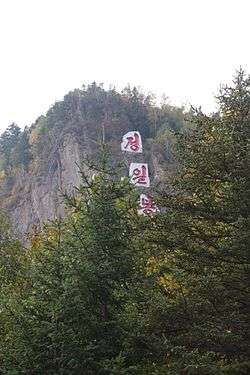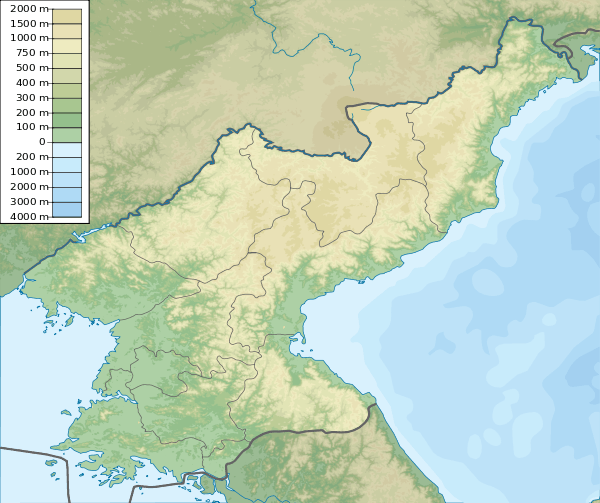Jong-il Peak
Jong-il Peak (Korean: 정일봉; Hanja: 正日峰; RR: Jeongilbong; MR: Chŏngilbong) is one of the peaks of Mount Sobaek, south-east of Paektu Mountain. The height is 5,899 ft (1,798 m). It is located near the shore of Sobaek Stream, in Samjiyon County, Ryanggang Province, North Korea.
| Jong-il Peak | |
|---|---|
 Chŏng-il Peak in September 2008 | |
| Highest point | |
| Elevation | 5,899 ft (1,798 m) |
| Parent peak | Mount Sobaek |
| Coordinates | 41°51′50.68″N 128°09′19.84″E |
| Naming | |
| Native name | 정일봉 (Korean) |
| Geography | |
 Jong-il Peak | |
| Country | North Korea |
| Province | Ryanggang |
| County | Samjiyon |
| Parent range | Changbai Mountains |
The main rocks of the peak are trachyte, rhyolite and basalt. The southern slope is a cliff about 328 ft (100 m) height, at the foot of the rock of 30–35° slope is a thick layer of scree, which is connected with the alluvial soil of the valley of Sobaek Stream. The flat northern slope is connected with Saja Peak. The Eastern slope is steeper than the western. At the Chŏng-il Peak, which is surrounded by dense forest, over 300 species of plants grow, including 16 species of trees and 40 species of shrubs. There are Manchurian Fir, Jezo Spruce and Olgan Larch growing around the peak, and well as Royal Azalea, Rhododendron mucronulatum and Japanese Rowan on the southern slope.
Initially, the peak was named Changsu. In 1930–1940, there was the secret camp of anti-Japanese guerrillas under with the rate of the Korean People's Revolutionary Army. According to the official North Korean historiography, Kim Jong-il was born there. In 1988, the peak was renamed to Jong-il, in honour of Kim Jong-il. A “Revolutionary Historic Site” was arranged at the territory of the former camp. Three granite plates with the name of peak, carved in red letters, were constructed on the southern rock. In 1992, for the Kim Jong-il's 50ᵗʰ anniversary, a memorial plate with congratulatory ode “To the Shining Star” by Kim Il-sung was placed near the camp.[1]
There are lot of literary works in North Korea carolling Jong-il Peak. O Yŏng-jae has writing about the peak in 6ᵗʰ chapter of “Sons of the people” (1991).[2] “Oh, Jong-il Peak” by Chŏn Byŏng-gu (1989)[3] and “The Thunderstorm over Jong-il Peak” by Wangjaesan Light Music Band[4] were dedicated to the peak.